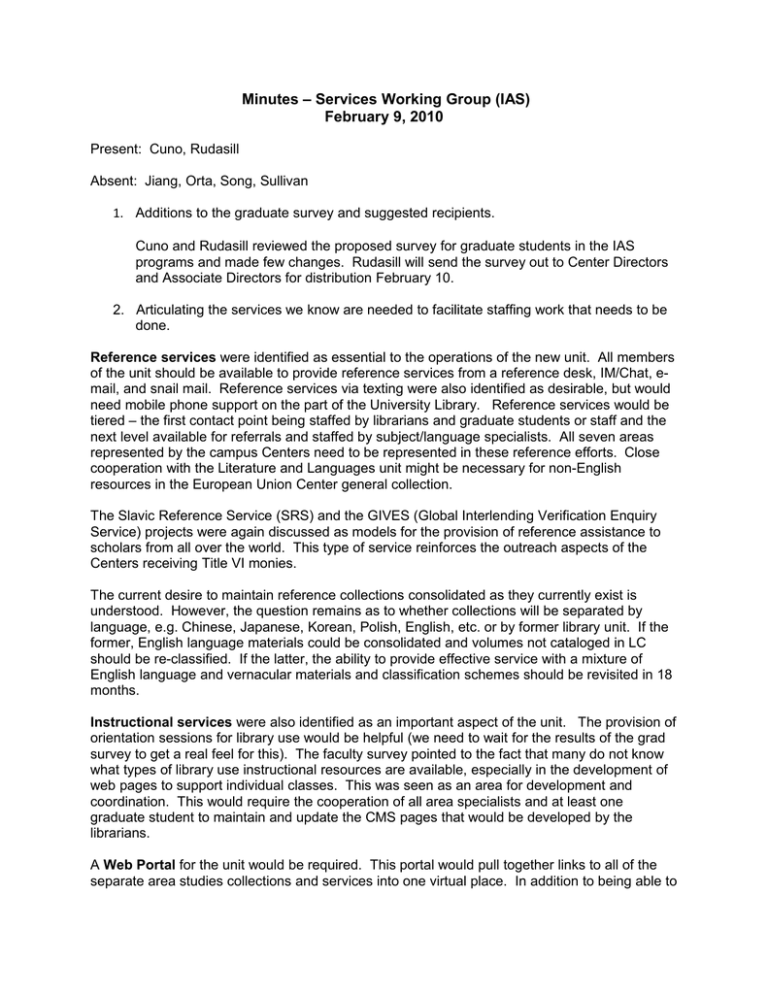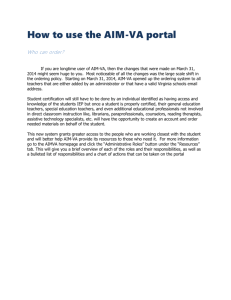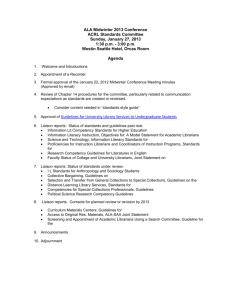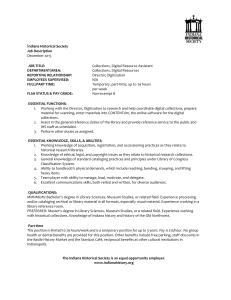Minutes – Services Working Group (IAS) February 9, 2010
advertisement

Minutes – Services Working Group (IAS) February 9, 2010 Present: Cuno, Rudasill Absent: Jiang, Orta, Song, Sullivan 1. Additions to the graduate survey and suggested recipients. Cuno and Rudasill reviewed the proposed survey for graduate students in the IAS programs and made few changes. Rudasill will send the survey out to Center Directors and Associate Directors for distribution February 10. 2. Articulating the services we know are needed to facilitate staffing work that needs to be done. Reference services were identified as essential to the operations of the new unit. All members of the unit should be available to provide reference services from a reference desk, IM/Chat, email, and snail mail. Reference services via texting were also identified as desirable, but would need mobile phone support on the part of the University Library. Reference services would be tiered – the first contact point being staffed by librarians and graduate students or staff and the next level available for referrals and staffed by subject/language specialists. All seven areas represented by the campus Centers need to be represented in these reference efforts. Close cooperation with the Literature and Languages unit might be necessary for non-English resources in the European Union Center general collection. The Slavic Reference Service (SRS) and the GIVES (Global Interlending Verification Enquiry Service) projects were again discussed as models for the provision of reference assistance to scholars from all over the world. This type of service reinforces the outreach aspects of the Centers receiving Title VI monies. The current desire to maintain reference collections consolidated as they currently exist is understood. However, the question remains as to whether collections will be separated by language, e.g. Chinese, Japanese, Korean, Polish, English, etc. or by former library unit. If the former, English language materials could be consolidated and volumes not cataloged in LC should be re-classified. If the latter, the ability to provide effective service with a mixture of English language and vernacular materials and classification schemes should be revisited in 18 months. Instructional services were also identified as an important aspect of the unit. The provision of orientation sessions for library use would be helpful (we need to wait for the results of the grad survey to get a real feel for this). The faculty survey pointed to the fact that many do not know what types of library use instructional resources are available, especially in the development of web pages to support individual classes. This was seen as an area for development and coordination. This would require the cooperation of all area specialists and at least one graduate student to maintain and update the CMS pages that would be developed by the librarians. A Web Portal for the unit would be required. This portal would pull together links to all of the separate area studies collections and services into one virtual place. In addition to being able to link to the individual area of interest, users of the portal would also find general information re: reference hours and language assistance that might be available, general and shared policies for reference and instruction provision, and other cooperative projects such as SRS/GIVES. The Content Management System currently in used for University Library electronic resources would provide a common interface to users, as well as the ability to customize pages to the specific areas studies. We speculated that it would be beneficial for area studies librarians to request that some funding through the Title VI grants that are currently being written provide support for these efforts. The proposal to keep updated lists of video/DVD recordings in a prominent place on the portal was also discussed. Digitization Services were also seen as important in the new unit. Both the librarians and the teaching/research faculty should be encouraged to identify materials requiring digitization support. The process of digitization, especially for those out-of-print or public domain materials, should be encouraged and the means to achieve the enrichment of collections via digitization should be provided. This process could be a point of coordination between the Centers and the Library or between the area specialist and the scholarly communication efforts of the Library. Visiting Scholar Support was also identified as an important area for service provision. The possibility of expanding programs such as the Slavic Summer Research Lab to other areas was discussed as well. This would benefit both the Centers and the libraries. Institutionally based library cooperation was another area ripe for development. The SRS has close relationships with several libraries outside the country. This model could be applied to all of the area studies at Illinois. It is not necessary to have the number one collection in the world to provide the best access to materials and expert reference support. Some of the resources identified to provide the listed services include: • • • • • • • • • Dedicated server space from the University Library (to archive and view streaming video, to provide an effective portal and to archive large files ) Graduate student support to provide language-specific reference service support and, perhaps instruction The cooperation of area specialists in providing reference services Microformat reader/scanners Areas dedicated to visiting scholars Support for summer research laboratories Welcoming area for study visible from the entry door Spaces for small meetings Seminar room The meeting ended after a brief tour of the spaces designated for the new unit.






